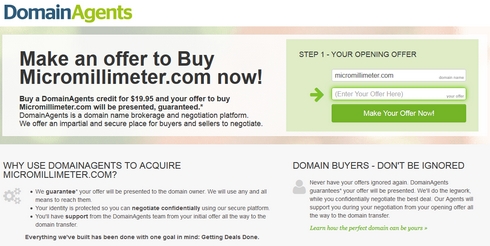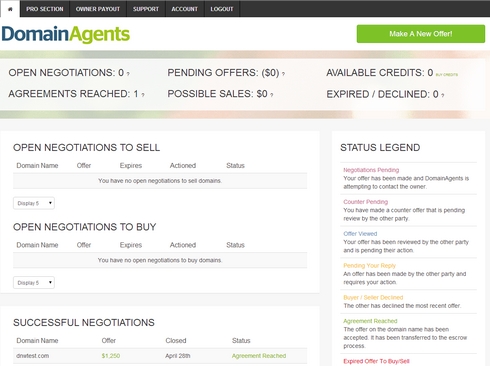DomainAgents adds system for domain name sellers.
Domain sales platform DomainAgents has made a major upgrade with the hopes of helping domain name investors sell more inventory.
DomainAgents launched as a “certified offer” service in 2012. Domain buyers would pay to submit an offer on a domain and DomainAgents would track down the owner to present the offer. Negotiations would take place over email. The original concept was somewhat similar to Network Solutions’ Certified Offer service.
The latest upgrade allows domainers to upload their portfolios, drive traffic to domain offer pages on DomainAgents and handle negotiations through an online interface.
Domainers can add “for sale” links on parked domains at various domain parking services to drive traffic to their DomainAgents offer pages. They can also include a link to the sales page when responding to emailed purchase inquiries. When people click the link they’ll be taken to DomainAgents where they can submit an offer:
Domainers can choose to charge potential buyers for their offer submission or make submissions free. Charging money qualifies the buyer, resulting in fewer tire kickers. As an added benefit, domain sellers get to keep half the submission price even if they don’t consummate a sale.
Sellers don’t get any information about the buyer if they charge an upfront fee. If the domain owner doesn’t charge an upfront fee then they get some information about the buyer, including a verified email address, name, and IP address.
Buyers pay a 10% fee plus Escrow.com charges when they make a purchase. Domain owners get at least half of this commission if they sent the referral. (DomainAgents also has registrar partners that send leads.)
The user interface is fairly simple, although some advanced features are under the hood. For example, domain owners can set up automated counter-offer rules based on how close the initial offer is to their asking price.
The negotiation interface is fairly simple and allows both sides to submit comments with their offers. DomainAgents doesn’t get involved in negotiations, but it will prompt the parties to continue discussions if they go stale.
I consider DomainAgents.com’s negotiation system similar to DomainNameSales.com (DNS), although both systems have their selling points.
DNS is fully integrated with parking which makes things simple and enables easy traffic data checks during negotiations. DNS also provides buyer information for all offers. However, you have to park with DNS to use its sales system.
DomainAgents’ fee-for-offer idea isn’t new, and I know a lot of domainers like to do this to screen for offers. I personally don’t want to block any sort of offer submission unless the domain is worth a lot and frequently gets lowball offers. The free offer option is a good option for people like me.
Another big difference: DomainAgents charges a commission (albeit to the buyer) while DNS doesn’t unless it handles negotiations. I suspect this “buyer’s premium” won’t affect the final price much, but some buyers will take it into consideration during negotiations. Keep in mind that sellers get a cut of the commission if they referred the buyer through a link.
DomainAgent’s revamped system is worth checking out to see if it works for you. It works for a lot of big domainers; Adam Strong and Richard Lau are investors and the company is lead by Phil McKegney.








Why would anyone choose to pay ten percent for a medium that is self brokered?
The buyer pays 10%, not the seller.
That’s correct, but there’s a small error in the second last paragraph. Should read “(albeit to the buyer)” That’s probably the source of the confusion.
Most buyers are new to domain names, so they often need help with the escrow and transfer process. We provide support and try to help both parties reach and then complete the deal as smoothly as possible.
ah yes, that would cause confusion. Sorry about that.
The seller also receives half the 10% commission back as a bonus.
I assume if an inquirer pays a fee to ‘bid’ on a domain, this is how buyer information (e.g. name, email, IP address) is collected. If no fee is required to ‘bid’, then buyer information is more difficult to collect.
Given the above, is the following statement (from the blog post) correct? Shouldn’t it be the other way around?:
~~~ “Sellers don’t get any information about the buyer if they charge an upfront fee. If the domain owner doesn’t charge an upfront fee then they get some information about the buyer, including a verified email address, name, and IP address” ~~~
If correct as is, this implies a DomainAgents policy decision to NOT share buyer info with sellers who demand an ‘inquiry/bid fee’, and to SHARE buyer data with sellers who do not charge a fee. What is the rationale behind this decision?
Confer,
It may seem counter-intuitive, but the post is correct.
I asked the same question. As the seller I’d always like to know who’s on the other end of the deal.
My understanding is the goal is to qualify the buyer in some way. If they pay up front then they’re qualified. If they don’t pay up front, then be submitting a confirmed email address they are “qualified”.
There could also be some sort of agency issue when you accept payment.
When DomainAgents launched we did not have a free offer product. As we moved forward with the development of the professional product, our beta testers requested a non-qualified (free offer) product and access to buyer information.
With the standard qualified offer product, the buyer pays and other than their IP address and location, their identity is not revealed while negotiating. In addition to start to finish support as required, part of what the buyer is paying for is confidentiality.
With the free offer product, the buyer is required to verify their email address before an offer is placed and the buyer provides the rest of their contact information, but it is not verifiable.
For sellers this is their choice:
Choose to qualify offers up front and be paid a portion of the fee that buyers pay to make an offer, but not receive buyer information.
Or
Choose to allow people to make free offers via their own traffic and receive buyer information, but not be paid to negotiate.
In the last two months I received two leads from DomainAgents. I didn’t list my domains or anything and it looks like the buyers came through DomainAgents partners. First lead turned into a successful sale and the other went cold.
When I received email notification about the first lead I wasn’t going to sign up because they ask you to sign up first to see more details about the offer (amount, buyer info, etc..) but after a little research and when I saw Adam Strong name associated with the service I went ahead and signed up.
only ever received lowball offers via domainagents. not sure why people would to pay to make an offer of $200.
It’s certainly interesting, but we always advise that the opening offer is a starting point and not necessarily representative of the client’s final budget.
We regularly see $200 offers close in the $x,xxx range or higher at times. But with that said, some people really do have a $200 budget.
It’s always worth negotiating.
Hello, I am experiencing great distress from Phil McKegney’s site whoisology.com. I have told him that I have a stalker who proudly told me that he had found my details on whoisology.com. In addition I have had incidences of identity fraud. Phil McKegney fails to even acknowledge the issues his business is causing to people’s safety! I have been paying for domain privacy for nearly two years, yet whoisology still refuses to delete my personal details from before that time. Any advice would be much appreciated.